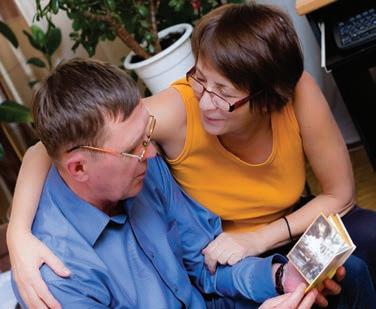
3 minute read
Palliative Care Means More Good Days
Palliative (pal-lee-uh-tiv) medicine is a specialty for anyone of any age living with a chronic or serious illness. This care helps people live each day as fully as possible by relieving pain and other distressing symptoms and providing support to the patient and family.
Who provides care? The palliative team may include a physician, RN or advanced practice nurse and a social worker. Providers are skilled at helping patients and families navigate the often complex emotional and practical considerations of living with illness.
How does it work? Palliative Care starts with a meeting between the patient, family and the palliative provider. The first question is: What’s important to you? The answer informs a person’s unique plan of care. Palliative practitioners work with with a person’s existing primary care doctor and specialists, adding a layer of care.
Support at Crossroads When patients find themselves with decisions about treatment or planning for their lives, the palliative practitioner can provide understanding and guidance. Providers can tailor medication or other treatment so
Palliative Care Means More Good Days people have more energy for living their lives. Family Support One of patients’ top concerns is how their disease or illness impacts the people closest to them. Palliative care helps people understand and talk about their illness better and provides family with support, tools and information.
Where is palliative care provided?
Care is provided in a person’s private residence, assisted living or skilled nursing facility or the hospital setting.
Who pays for
palliative care? Medicare, Medicaid and most private insurance covers all or part of palliative care. As the wife of a palliative patient noted: Oncologists treat cancer, cardiologists the heart. But what happens to the rest of you? Palliative care can be the facilitator for all to work together for the common good of the whole person. ~ Editor’s Note: This article was submitted by Kelly Bastian, FNP-C, Managing Director of Agape Palliative Care. For more information she may be reached at 720-482-1988. See ad on page 95.
HOSPICE CARE DEFINITIONS
Hospice Care Definitions continued from page 93
through an IV pump. If this is the situation, inquire with the hospice RN case manager to see if pain pumps are available through their agency.
PALLIATIVE CARE – Specialized medical care for people with serious illness. It is focused on providing patients with relief from the symptoms, pain and stress of a serious illness – whatever the prognosis. It is appropriate at any age and at any stage in a serious illness and can be provided along with curative treatment.
PCP-OVERSIGHT – Can the hospice patient retain their own primary care physician in addition to the hospice medical director? All hospice organizations require a medical director, a physician to oversee their care. Many times the hospice medical director will work in conjunction with the patient’s own physician. The patient, family and hospice team can determine which physicians will oversee the care and certify the hospice eligibility criteria.
PET THERAPY – There’s nothing like a visit from a four-legged creature to brighten the day of a terminally ill patient. Pet therapy teams visit with patients wherever they reside – at home or in professional care settings. Studies have shown many benefits of pet companionship, ranging from reduced blood pressure and anxiety to relief from boredom, pain and loneliness. This service is not reimbursed by Medicare.
VA CONTRACT – If the patient is not a Medicare Recipient and is covered by the VA, the VA will make payments directly to their contracted agencies. If a patient is a Veteran, but is a Medicare Recipient, they may choose any Medicare approved hospice agency for their care. ~


How can I find the right housing for my elderly loved one? Start your search and compare communities and facilities at SeniorsBlueBook.com/local/Colorado-Boulder






